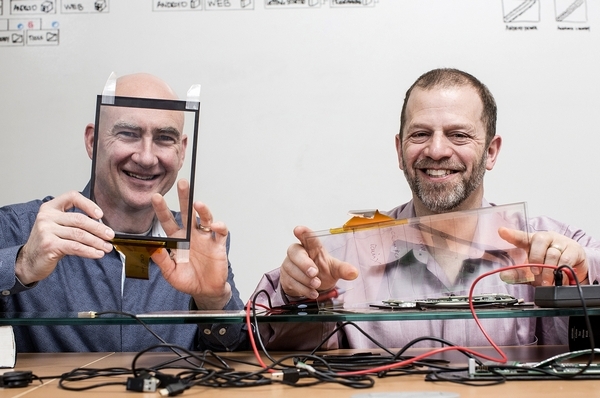Innovators
What if you could feel textures on your smartphone?
Comments
Email
Print

Ed Colgate and Michael Peshkin think you should be able to feel more than just a buzz on your smartphone. Soon, perhaps, you may. They've developed technology that could make it possible for you to feel textures like corduroy, suede or velvet on a retail website or to scroll through web pages largely by feel instead of having to glance at the screen.
The two Northwestern University mechanical engineering professors, who have worked together for nearly 30 years, are experts in haptics, or the science of touch. They've raised $5 million for their West Loop startup called Tanvas. Their product was a wow at this year's Consumer Electronics Show, the annual gadget-fest in Las Vegas. “Someone walked up and said, 'You did it,' ” Tanvas CEO Greg Topel says.
What Colgate and Peshkin have done is rethink the physics of today's touch screens. When you tap on a screen to open an email or type a text or swipe up to read more, your device knows where your finger is because your skin breaks the electrical field emanating from the glass. Tanvas adds a targeted electrode, controlled by software, that interacts with the charge of your skin, pulling your finger to the screen, creating the sensation of friction. That means devices can both provide and receive touch input.
“Today's interaction is mostly built for the eyes, so it's pretty hard for people to imagine how it could be used,” says Hong Tan, an electrical and computer engineering professor at Purdue University. “Once we get there, I don't think we'll ever want to go back to a world where we can only see.”
Tanvas, which has 10 employees but no revenue yet, has a dozen patents on its technology, which has been in the works for a decade. In 2007, one of Colgate and Peshkin's grad students demonstrated their technology at a conference in Japan, creating the illusion of fish scales on a touch screen. Stroked one way, it felt smooth; stroked the other, rough. The crowd of scientists voted it the best demo.
With money from R7 Partners, Peak6 and Northwestern, the founders are searching for the right application. One may be in touch-screen controls in cars, allowing drivers to move around the display by feel and reducing the amount of time they take their eyes off the road.
Tanvas is the third startup for the professor-partners. Colgate, 53, who grew up in Florida, is a pioneer in haptics. Peshkin, 58, was born in Evanston and is an expert in human-robot interaction. In 1996, they launched a robotics company called Cobotics that they sold to Stanley Black & Decker. They later launched a research and development firm, Kinea Design, which developed a robotic device to assist therapists at the Rehabilitation Institute of Chicago.
“It's all about people and machines,” Peshkin says. The two things are more closely intertwined than ever. With help from Tanvas, maybe they'll finally be in sync
 Meet 20 twentysomethings you need to know
Meet 20 twentysomethings you need to know
 Behind the mask? Plenty of sales
Behind the mask? Plenty of sales
 Crain's wins six Lisagor Awards
Crain's wins six Lisagor Awards